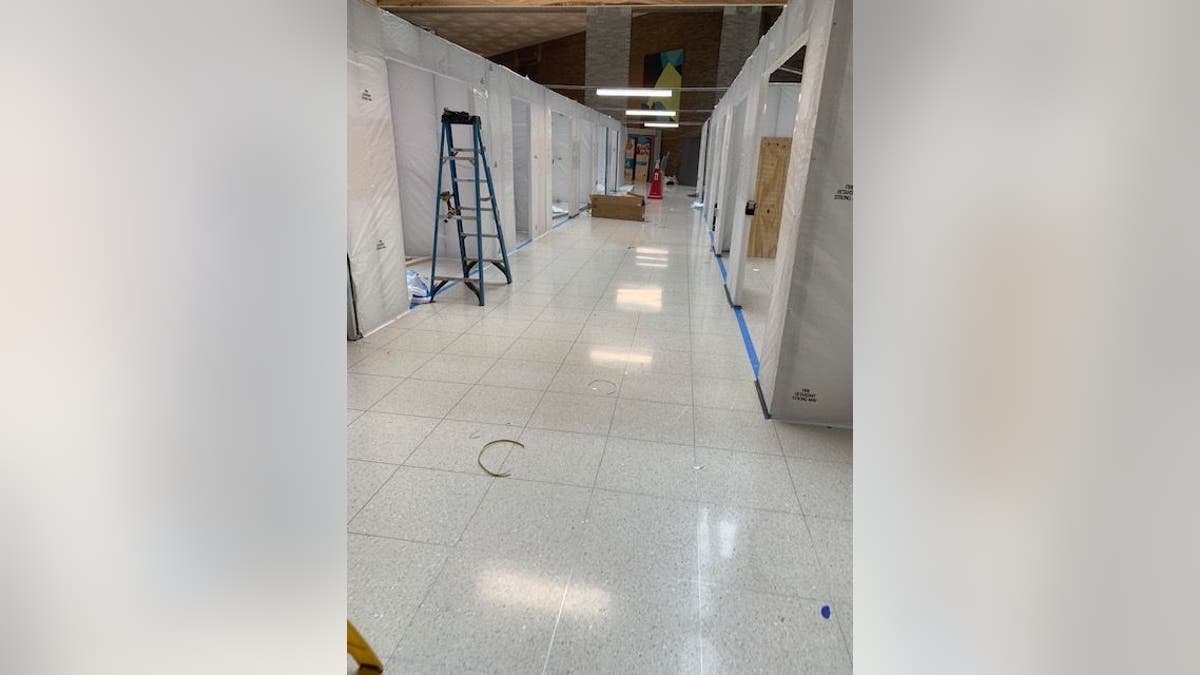
In the lobby of The Mount Sinai Hospital on Manhattan's Upper East Side (pictured above), officials are building additional rooms to handle an overflow of COVID-19 patients.
One nurse rides the subway each day wondering if she’ll have the proper protective equipment for her 12-hour shift, while another worries about a shortage of hydrogen peroxide wipes.
Emergency room nurses at Mount Sinai Hospital on Manhattan’s Upper East Side – one of the best hospitals in the country – say they are facing a multitude of challenges as they battle COVID-19 on the front lines that are putting their own health at great risk.
The regular exposure to danger should earn them "hazard pay," but none are receiving it, they said.
In stark contrast, out-of-state nurses called in to assist Mount Sinai staff are making an extra $2,000 to $5,000 a week – with many of them receiving additional accommodations, like lodging and transportation – according to multiple sources with knowledge of the situation.
"I absolutely signed up to take care of the sick and dying – there’s nothing else I’d rather do – but it’s frustrating to be treated this way in a time of crisis and when we have inadequate protection," said one Mount Sinai nurse.
"It is unfair to all of us," said another, adding that a petition may be underway demanding additional pay until the risk of infection from supply shortages is greatly reduced.
"Having to pay for an Uber every day, to and from work, is not feasible," the nurse said. "I love our doctors and the directors of our department but everyone on the front lines deserves better."
All of the nurses interviewed spoke on condition of anonymity because they were not authorized to speak publicly on the matter.
It’s unclear if an outside staffing agency or another entity is paying the out-of-state nurses. A spokeswoman for Mount Sinai did not immediately return a phone call and email from Fox News on Friday seeking comment.
Hazard pay is defined by the U.S. Department of Labor as additional pay for performing hazardous duty or work involving physical hardship. "Work duty that causes extreme physical discomfort and distress which is not adequately alleviated by protective devices is deemed to impose a physical hardship," according to the department’s website.
"You can send anything to the Mount Sinai ER – we have seen it all – but this has shaken everyone"
On Wednesday, President Trump said his administration is considering ways to compensate health care workers with additional hazard pay during the pandemic, though no plan has been unveiled yet.
"It’s something we’re discussing in terms of bonus or bonus pay," Trump said during a press briefing. "They’re like warriors, they’re like soldiers," he said of the doctors, nurses and healthcare workers on the front lines of the outbreak.
Like all emergency rooms in COVID-19 hotspots, the emergency room at Mount Sinai's main campus is in dire straits, with a high volume of patients needing intubation and a medical staff that is physically and emotionally fatigued.
"The volume of patients is rising as is the acuity level," said one nurse. "We’re intubating anywhere between 10 and 15 patients a night and we are understaffed."
"I have a lot of anxiety, and it’s very hard emotionally because when this first started we were told this is just affecting older people – that was the information that was coming out of other countries like Italy," the nurse added. "But that is not the case here. We are seeing people in their 30s, 40s and 50s with no other illnesses gasping for air."
All the nurses interviewed said they only get one N95 respirator mask for their entire 12-hour shift. Face shields must be wiped down and reused, they said.
"PPE [personal protective equipment] is not supposed to be reusable," said one nurse. "The odds of us getting sick are so high. We’re probably all going to have it at some point."
Two nurses spoke of a colleague who is currently sick and in quarantine after treating patients with the novel virus. Another nurse reported that "multiple nurses and doctors" have fallen sick from COVID-19.
"You can send anything to the Mount Sinai ER – we have seen it all – but this has shaken everyone," the nurse said.
Fox News’ Chris Ciaccia contributed to this report.








































